- Home
- Jim Thompson
South of Heaven Page 20
South of Heaven Read online
Page 20
Toddy lighted a cigarette fretfully, all but decided to begin the long trudge back to the bus stop. Still, if he quit early today, he would do it again. It might become a habit with him, complemented by the equally dangerous habit of starting to work late. Eventually, he would be working no more than an hour a day. And then the day would come when he would not work at all. That would be the end, brother. The end for him and a much quicker and more unpleasant end for Elaine. For regardless of her vain and frequent boasting, no one else but he would put up with her indefinitely.
With a shrug, he ground out the cigarette beneath his heel and took a decisive step up the walk. Swearing silently, he stopped again. Dammit, it was almost three—only ten minutes of. And it was such a hell of a gloomy day. Smog had settled over the city like a sponge. Gray, dank, sun-obscuring smog. Even if Elaine was all right when she awakened, the smog would start her off. She’d be depressed and blue, and if he wasn’t there…
Not only that, but he would be wasting his time at this particular house. Obviously, wealthy people lived here, despite the air of desolation. And wealthy people, even when they were inclined to dispose of their old gold, usually knew its value too well to make the transaction profitable.
“Sharp” gold-buyers have no contact with the law…willingly. The law, as they well know, takes a very dim view of their activities. Their licenses may be in order; they may have done nothing provably illegal. Still, a steady stream of complaints flows in their wake, and the police become irritated. The police reason that a man who persuades a housewife to sell him a hundred-dollar watch for five possesses no very high moral tone. He need get out of line very little, rub them the wrong way in the slightest, to be jailed for investigation and eventually “floated” out of town.
Toddy had stayed clear of the police so far, and he intended to keep right on doing so. There’d be no floater for him if he was ever picked up. Once they fingerprinted him, they’d be passing him from city to city until he got train sick. He couldn’t remember all the places where he was wanted, but he knew there were a great many.
But—and he hated to admit it, in this instance—he was in little danger from the police unless he deliberately and flagrantly annoyed them. If he had run out of cards, the situation would have been different. But he had not run out; he was always careful to keep supplied. His reluctant fingers found one now, drew it from the breast pocket of his smart tweed coat.
Mr. Toddmore Kent
Special Representative
LOS ANGELES JEWEL & WATCH CO.
Brokers In
Gold Silver Platinum
The Los Angeles Jewel & Watch Co. was a side-street watch-repair shop. Its owner was a beer-loving, bighearted little Dutchman named Milt Vonderheim.
Most wholesale buyers of precious metals give their door-to-door men the same kind of skinning that the latter deal out to their clients. They downgrade your ten-karat gold to eight; they weigh coin and sterling silver together; they “steal” your platinum at a price merely twice as high as that of twenty-four-karat gold. But tubby little Milt, with his beer breath and perpetual smile, was the golden exception to the base rule of other buyers.…So a man needed his money every night—was that a reason to rob him blind? So he had no regular residence in the city and was at the mercy of one who did—should you charge him a profit for not speaking to the police?
Milt didn’t think so. Milt’s prices were only a few cents lower than those of the U.S. Mint, to whom he sold the stuff which Toddy and a number of other young men sold to him. Milt paid five dollars a pennyweight—one twentieth of a troy ounce—for platinum. If you’d have a lean day, he was very apt to upgrade your stuff; pay you fourteen-karat prices, say, for ten.
Nor was that all Milt did: fat, shabby little Milt, edging deeper and deeper into poverty. Milt supplied these cards which were literally worth their weight in gold if a cop stopped you. A cop wouldn’t bother you when you showed that card, unless he had to. A transient gold-buyer was one thing. A special representative of a long-established local firm, no matter how small, was something else.
Milt had started Toddy out as a gold-buyer a year ago. He had trained him, stood by him through the perils that beset the trade. He had trained other men, too, Toddy knew, most of those who now sold to him, and he stood by them also. But he did not treat them quite the same as he did Toddy. He was always inviting Toddy back into his shop apartment for a beer or a chat. He was always bragging of him.
“That Toddy,” he would boast to the other buyers, “from him you could well take a lesson. Regularity, steadiness, that iss the lesson vot Toddy should give you. While you boys are putting on your pants or drinking coffee, Toddy has already made fife dollars.”
Toddy’s lean face flushed a little as he remembered those boasts. Resolutely, he brushed a bit of cigarette ash from his whipcord trousers, made a slight adjustment on the collar of his tan sports shirt, and turned his pebbled-leather brogans up the walk to the house.
It was even farther away than it had appeared from the street, and he had an uneasy feeling of being watched from the dark interior behind the rusted screen door. But, hell, what was there to be nervy about? He wasn’t giving the police any trouble and they weren’t giving him any. And what else was there besides a slammed door or a dog? If he was starting to let things like that bother him, he might as well do a high brody right now. He and Elaine together.
He stepped lightly across the porch, splattered with green segments from the cedars, and raised his hand to knock. He jerked it back, startled.
“Yes?” said a man’s sharp-soft voice. “What is it? You are selling something, please?”
The man must have been standing right in the door, hidden by the rusted screen and the shadowed room inside. Toddy blinked his eyes, trying to get the daylight out of them, but he still couldn’t see the guy. All he knew about him was his voice—a Spanish-sounding voice.
“Not at all, sir,” said Toddy, with energetic joviality. “I’m not selling a thing. A friend of yours suggested that I call on you. If I can give you my card…”
The screen opened and a bony, hair-tufted hand emerged. Deftly, it plucked the card from his fingers and disappeared. Toddy shifted uncomfortably.
This was all wrong, he knew. The spiel was off-key here, the gimmick was out of place. He had learned to use the card as a door-opener—to get ’em curious. To force them outside, or to get him in. He had learned to mention a neighbor, or, better still, a “friend.” If they fell for it—and why shouldn’t some neighbor or friend have suggested a call?—it was all to the good. If they got funny or sharp, he could have the “wrong house,” lie out of it some way.
You had to do those things.
Toddy wished that he hadn’t done them here.
He looked behind him, down the long inviting walk. He gave a slight hitch to his trousers and snuggled the box firmly under his arm. He’d give some excuse and beat it out of here. Or just beat it without saying anything. After all, he—he—
The screen door swung open, wide.
Through it, with stately but threatening grace, stalked the biggest dog Toddy had ever seen. He did not realize just how big it was until a moment later.
He knew very little about dogs, but he recognized this one as a Doberman. Slowly, it lowered its great pear-shaped head to his feet and examined each in turn. With awful deliberation, the animal sniffed each leg. It looked up at him thoughtfully, appraising him.
Silently, it reared up on its hind legs.
The front paws came down on Toddy’s shoulders. The black muzzle almost rested against his nose.
Toddy stared into the beast’s eyes. He stared unwinkingly, afraid to move or speak. He stopped breathing and was too fear-stricken to know it.
The screen door closed, slammed at last by its aged spring. As from a great distance, Toddy heard the man’s amused chuckle, a seemingly unending chuckle; then, a sharp “Perrito!”—Spanish for “little dog.”
The dog’s ears
pricked to attention. “Ssor-ree,” the dog said courteously. “Ssss ssor-ree.”
“D-don’t m-mention it,” Toddy stammered. “A mistake. I m-mean—”
The dog dropped back down to the porch and took up a position behind him. The screen door opened again.
“Please to come in,” said the man.
“I don’t—that d-dog,” said Toddy. Dammit, was he dreaming this? “Won’t he…will he hurt anyone?”
“On the contrary,” the man said, and, helplessly, Toddy stepped inside. “He kills quite painlessly.”
Acclaim for Jim Thompson
“The best suspense writer going, bar none.”
—New York Times
“My favorite crime novelist—often imitated but never duplicated.”
—Stephen King
“If Raymond Chandler, Dashiell Hammett, and Cornell Woolrich would have joined together in some ungodly union and produced a literary offspring, Jim Thompson would be it.…His work casts a dazzling light on the human condition.”
—Washington Post
“Like Clint Eastwood’s pictures it’s the stuff for rednecks, truckers, failures, psychopaths and professors.…One of the finest American writers and the most frightening, Thompson is on best terms with the devil. Read Jim Thompson and take a tour of hell.”
—New Republic
“The master of the American groin-kick novel.”
—Vanity Fair
“The most hard-boiled of all the American writers of crime fiction.”
—Chicago Tribune
Recently released e-books by Jim Thompson
The Killer Inside Me
The Grifters
A Swell-Looking Babe
The Nothing Man
After Dark, My Sweet
Pop. 1280
Wild Town
The Getaway
The Kill-Off
Nothing More than Murder
A Hell of a Woman
Bad Boy
Heed the Thunder
The Rip-Off
Roughneck
Cropper’s Cabin
Savage Night
The Alcoholics
Texas by the Tail
Now and On Earth
The Transgressors
Recoil
The Criminal
South of Heaven
The Golden Gizmo
Contents
Title Page
Welcome Page
Epigraph
1
2
3
4
5
6
7
8
9
10
11
12
13
14
15
16
17
18
19
20
21
22
23
24
25
26
27
28
29
30
31
32
33
34
About the Author
Preview of The Golden Gizmo
Acclaim for Jim Thompson
Books by Jim Thompson
Copyright
Copyright
The characters and events in this book are fictitious. Any similarity to real persons, living or dead, is coincidental and not intended by the author.
Copyright 1967 by Jim Thompson
Copyright © renewed 1995 by Alberta Thompson, Sharon Thompson Reed, Patricia Thompson Miller and Michael John Thompson, sole heirs of Jim Thompson
Excerpt from The Golden Gizmo copyright © 1954 by Jim Thompson, copyright © renewed 1982 by The Estate of Jim Thompson
Author photograph by Sharon Thompson Reed
Cover design by Allison J. Warner; cover art: Getty Images
Cover copyright © 2012 by Hachette Book Group, Inc.
All rights reserved. In accordance with the U.S. Copyright Act of 1976, the scanning, uploading, and electronic sharing of any part of this book without the permission of the publisher constitute unlawful piracy and theft of the author’s intellectual property. If you would like to use material from the book (other than for review purposes), prior written permission must be obtained by contacting the publisher at [email protected]. Thank you for your support of the author’s rights.
Mulholland Books / Little, Brown and Company
Hachette Book Group
237 Park Avenue, New York, NY 10017
www.mulhollandbooks.com/jimthompson
www.twitter.com/mulhollandbooks
www.facebook.com/mulhollandbooks
www.hachettebookgroup.com
First e-book edition: July 2012
The publisher is not responsible for websites (or their content) that are not owned by the publisher.
ISBN 978-0-316-19591-1

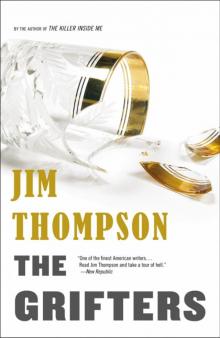 The Grifters
The Grifters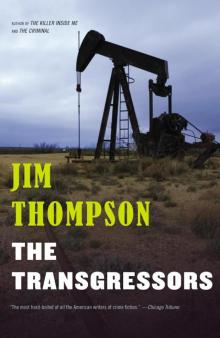 The Transgressors
The Transgressors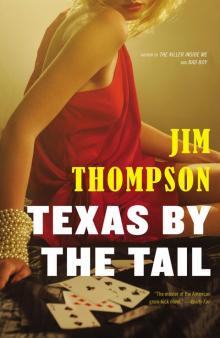 Texas by the Tail
Texas by the Tail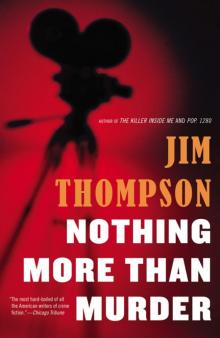 Nothing More Than Murder
Nothing More Than Murder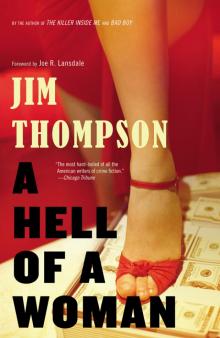 A Hell of a Woman
A Hell of a Woman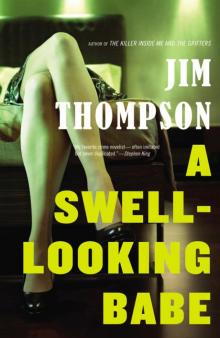 A Swell-Looking Babe
A Swell-Looking Babe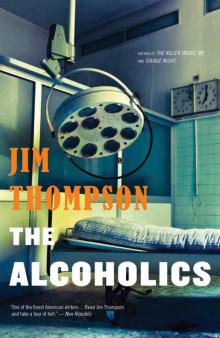 The Alcoholics
The Alcoholics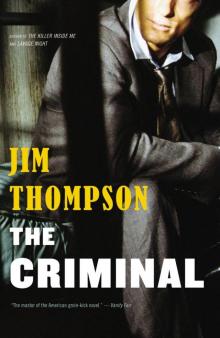 The Criminal
The Criminal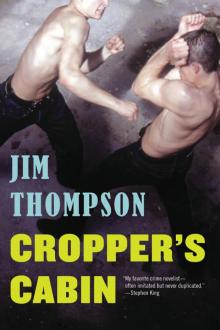 Cropper's Cabin
Cropper's Cabin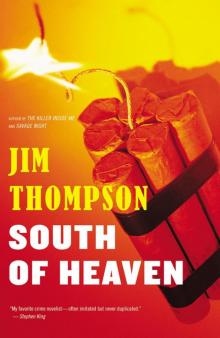 South of Heaven
South of Heaven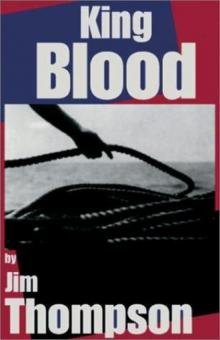 King Blood
King Blood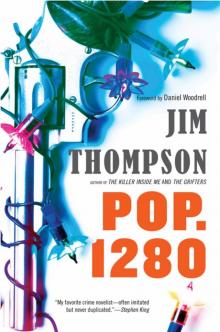 Pop. 1280
Pop. 1280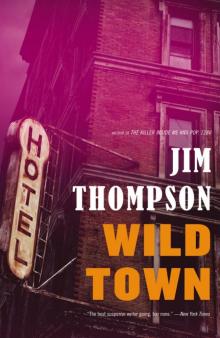 Wild Town
Wild Town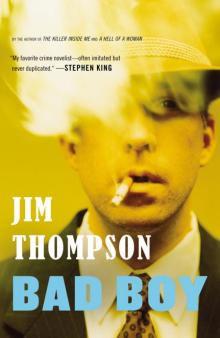 Bad Boy
Bad Boy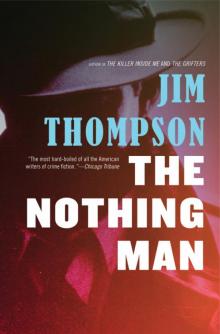 The Nothing Man
The Nothing Man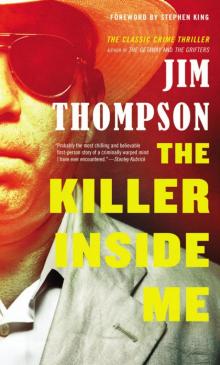 The Killer Inside Me
The Killer Inside Me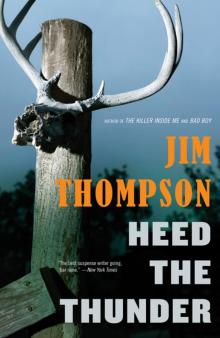 Heed the Thunder
Heed the Thunder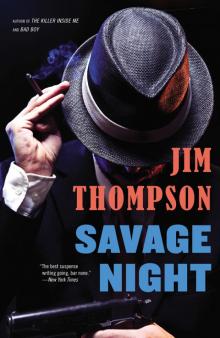 Savage Night
Savage Night Recoil
Recoil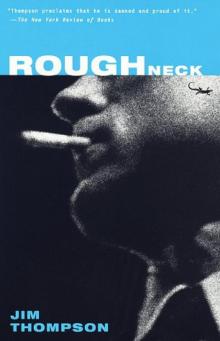 Roughneck
Roughneck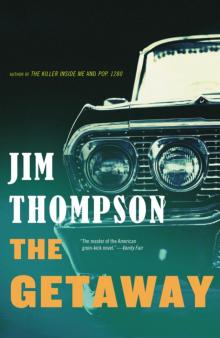 The Getaway
The Getaway